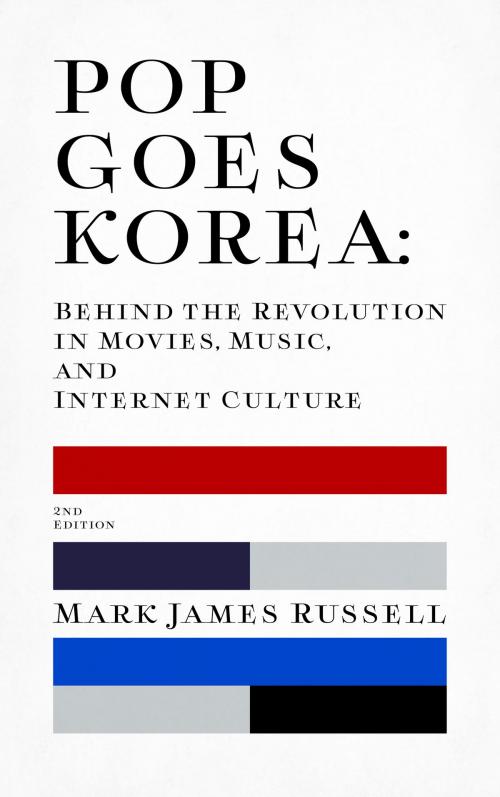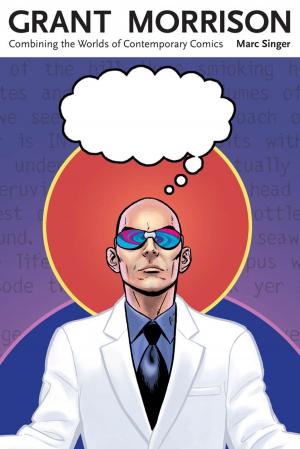Pop Goes Korea
Behind the Revolution in Movies, Music and Internet Culture (2nd Edition)
Nonfiction, Entertainment, Music, International, History, Asian, Korea, Social & Cultural Studies, Social Science, Cultural Studies, Popular Culture| Author: | Mark James Russell | ISBN: | 1230002054865 |
| Publisher: | Mark Russell | Publication: | December 19, 2017 |
| Imprint: | Language: | English |
| Author: | Mark James Russell |
| ISBN: | 1230002054865 |
| Publisher: | Mark Russell |
| Publication: | December 19, 2017 |
| Imprint: | |
| Language: | English |
Today, most everyone has heard of South Korean pop culture. The flashy, exciting world of K-pop, like BTS, Exo, Twice and 2NE1 (and, yes, Psy's "Gangnam Style"). Hit movies like Oldboy, Train to Busan, and The Host. Addicting TV dramas like Jewel in the Palace, My Love From the Star, and Descendants of the Sun.
But how did this happen? How did South Korea come from nowhere in the 1990s to become one of the biggest producers of pop content (movies, music, comic books, TV dramas, online gaming) in Asia—and the West. What made it happen? Who’s behind it?
Pop Goes Korea tells an exciting tale of rapid growth and wild success marked by an uncanny knack for moving just one step ahead of changing technologies (such as music downloads and Internet comics) that have created new consumer markets around the world. Korea's success had little to do with government planning and everything to do with creative, driven dreamers who challenged the status quo and made all these changes possible.
To tell that story, Pop Goes Korea looks at:
– film director Kang Je-gyu, maker of Korea’s first blockbuster film Shiri;
– top actor Lee Byung-hun, who starred in many of the biggest Korean television dramas and movies, and is leading the wave of Korean stars coming to Hollywood;
– Lee Soo-man, who went from folk singer to computer programmer to creator of Korea’s biggest music label, SM Entertainment;
– Miky Lee, who (together with her brother) helped transform a sleepy confectionary company into CJ Entertainment, Korea’s biggest entertainment conglomerate.
– Sean Yang, whose P2P program Soribada nearly destroyed Korea’s music business, but then led its resurrection;
– Shin Joong-hyun, the godfather of Korea’s amazing rock music from the 1960s and ’70s;
– Rain, Korea’s biggest international pop star;
– Nelson Shin, who fled North Korea during the war and became one of Korea’s leading animators.
Perhaps most importantly, the stories in Pop Goes Korea are not just Korea stories. The forces of globalization, technology and media that radically reshaped Korea are coming to the rest of the world, challenging local cultures, but also providing the opportunity to fight back against Hollywood and succeed like never before. Pop Goes Korea provides the blueprint, to help people everywhere better understand these trends and prepare for what is coming next.
Today, most everyone has heard of South Korean pop culture. The flashy, exciting world of K-pop, like BTS, Exo, Twice and 2NE1 (and, yes, Psy's "Gangnam Style"). Hit movies like Oldboy, Train to Busan, and The Host. Addicting TV dramas like Jewel in the Palace, My Love From the Star, and Descendants of the Sun.
But how did this happen? How did South Korea come from nowhere in the 1990s to become one of the biggest producers of pop content (movies, music, comic books, TV dramas, online gaming) in Asia—and the West. What made it happen? Who’s behind it?
Pop Goes Korea tells an exciting tale of rapid growth and wild success marked by an uncanny knack for moving just one step ahead of changing technologies (such as music downloads and Internet comics) that have created new consumer markets around the world. Korea's success had little to do with government planning and everything to do with creative, driven dreamers who challenged the status quo and made all these changes possible.
To tell that story, Pop Goes Korea looks at:
– film director Kang Je-gyu, maker of Korea’s first blockbuster film Shiri;
– top actor Lee Byung-hun, who starred in many of the biggest Korean television dramas and movies, and is leading the wave of Korean stars coming to Hollywood;
– Lee Soo-man, who went from folk singer to computer programmer to creator of Korea’s biggest music label, SM Entertainment;
– Miky Lee, who (together with her brother) helped transform a sleepy confectionary company into CJ Entertainment, Korea’s biggest entertainment conglomerate.
– Sean Yang, whose P2P program Soribada nearly destroyed Korea’s music business, but then led its resurrection;
– Shin Joong-hyun, the godfather of Korea’s amazing rock music from the 1960s and ’70s;
– Rain, Korea’s biggest international pop star;
– Nelson Shin, who fled North Korea during the war and became one of Korea’s leading animators.
Perhaps most importantly, the stories in Pop Goes Korea are not just Korea stories. The forces of globalization, technology and media that radically reshaped Korea are coming to the rest of the world, challenging local cultures, but also providing the opportunity to fight back against Hollywood and succeed like never before. Pop Goes Korea provides the blueprint, to help people everywhere better understand these trends and prepare for what is coming next.















